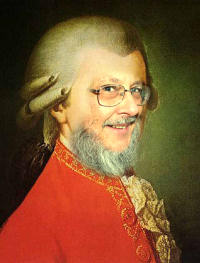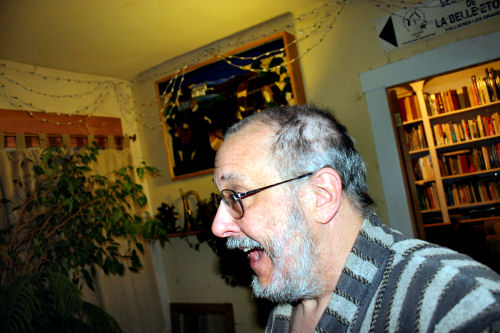A 365-Day Project
"We Are All Mozart"
A project to create
new works and change
the perception of the
music of our time.


 February 13, 2007
February 13, 2007 
A short one today. First, some readers have commented on my grouchy attitude the past few days. Well, yes, that's true. It's hard to say why, but when one sees ahead the downward slope of a lifelong career and realizes that attitudes toward one's chosen work pretty much haven't moved from the reactionary state they were found in during the bloom of creative youth, it makes a body irritable. It doesn't stop the creative flow, but it does leave a Brooklyn dollop of wistfulness on life's plate, surrounded by diminishing California mini-helpings of possibility. Where are all those monumental orchestral events, staggering electronic worldscapes, symphonies of weather itself? In dreams. But still in dreams.
* * *
Now where was I? Ah, the compositions in progress. Yesterday Compound Refractions for solo flute was finished. The name and the writing both suggest classic flute compositions, and also the piece's construction. A few small themes are entwined at the opening, stripped to their essentials, and scattered about. The challenge in writing this piece was the commissioner, John McMurtery, with his ability to play the simplest through the Ferneyhough-est. That's intimidating, not only because of the time constraint, but also because my recent work hasn't had that Ferneyhough-like confrontation. It's about sound as a kind of subdermal experience.
So the piece was built almost instinctually, without running self-analysis (as far as I can tell in retrospect). One motive led to the next and back to itself again, taking time for explorations and skirmishes, and then returning to the fragments and running them out like an old LP record groove or the slowing breath after a long hike. Yes, metaphors all. Without going back to the composition and searching for the decisions that were made, I'm left with metaphor. (There will be more.)
You can find the score and listen to a demo. If you're just listening, note that in the score there comes a moment where the performer whistles, then whistles while playing, and then hums while whistling and playing. There's more humming while playing, and this peculiar moment of melodic stasis vanishes -- none of it very good in the demo.
* * *
Today was my annual gig as official photographer for the Vermont Grocers' Association annual Legislative Day. Grocers are big here. The Vermont House Ways & Means Committee held a hearing on tax simplification especially for the grocers' group, and then Governor Jim Douglas gave a brief talk and introduced a philosophical nemesis -- whom he called his "guru" -- Frank Bryan. Bryan held the governor in his luncheon seat for an additional ten minutes by challenging him to listen to his point about governing. The governor stayed, and ducked out as soon as the ten minutes were up.
Clever, but that's not the point. The point is rather some comments about where I live, something that -- through a bit of good-natured shaming from one of my readers -- I've avoided lately. Bryan (author of Real Democracy: The New England Town Meeting and How It Works and a number of Vermont independence treatises) told a story of himself as a teenager hitchhiking along the highway along the Connecticut River, long before the interstate highways cut Vermont into a tourist haven and brought people like me as emigrants from New Jersey. As he walked in the deep quiet under a cloudless sky, he heard thunder in the distance. It came and went, but still no clouds portended a storm. And then he realized he was hearing, just over the spine of mountains, the Bear Ridge Speedway -- one of the few entertainments in Vermont in the 1960s with its snarling and roaring stock cars every weekend.
And there Bryan turned the story into metaphor. There is always one car at these races, he said, that is a mechanical debacle, unable to keep up. You know that car, he said. Eventually, the other cars come by and lap it. But for a few minutes, if you look at it just right just before it is lapped, that one car, that mechanical wreck, looks like it is ahead of the pack. That, he said, is the Vermont he knows -- the Vermont which skipped the Twentieth Century and its horrors and urban rat race and competing isms and smoke and factories and devastation, and went straight into the technological Twenty-First, a century that, he hoped, would bring a meeting of human and human and other in our tiny rural enclave. Like that car, he said, everyone else would see Vermont as behind. And it would be, until suddenly it was no longer behind but ahead for a flashing moment -- never part of the pack.

Put a pair of scissors in the hands of a five-year-old. Say, see my hair? See my beard? Cut 'em all off!